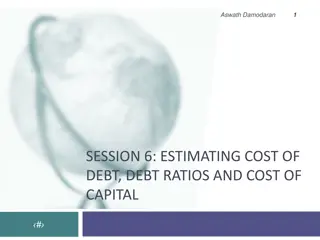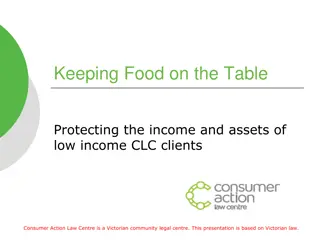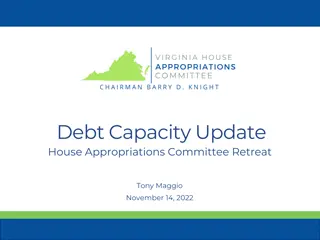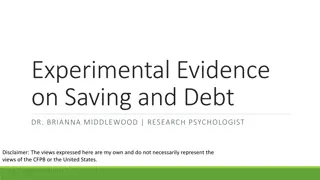Government Debt Response to COVID-19 Challenges and Solutions
Amid the COVID-19 pandemic, significant debt challenges have emerged, affecting businesses and individuals alike. Income shocks have led to increased levels of indebtedness, particularly among vulnerable groups. The government has responded with various measures such as local authority hardship funds and increased benefits to mitigate the financial impact on citizens. These interventions aim to alleviate the burden on those facing economic hardships during these uncertain times.
Download Presentation

Please find below an Image/Link to download the presentation.
The content on the website is provided AS IS for your information and personal use only. It may not be sold, licensed, or shared on other websites without obtaining consent from the author. Download presentation by click this link. If you encounter any issues during the download, it is possible that the publisher has removed the file from their server.
E N D
Presentation Transcript
Looking after our Customers: the government debt response to COVID-19 MALG National Members Meeting April 2020 Joseph Surtees, Government Debt Management Function
Contents 1. Debt challenges created by Covid-19 2. Government responses to Covid-19 3. Discussion points
1.Debt challenges created by Covid-19 1. Income shocks will likely increase indebtness a. 44% of firms are intending to furlough at least half of their workforce (British Chambers of Commerce) b. 30% of businesses are reducing staffing levels in the short term (ONS) c. On average, workers expect there is a 49% chance of them having problems paying their bills (Adams-Prassl et al) dddd 1. Some groups will face greater hardship than others a. 79% of people living in social housing are 'at risk' due to C19 (Resolution Foundation) b. Workers who earned less than 20,000 last year expect to earn just 58% of their usual income between now and August (Adams-Prassl et al) c. Sectors that are shut down as result of social distancing measures employed nearly a third (30%) of all employees under the age of 25 (Institute for Fiscal Studies)
2. Government responses to Covid-19 Measure Scope - 500m local authority hardship fund to bolster existing Council Tax Support schemes - Expectation is that billing authorities will provide all recipients of working age local council tax support with a further reduction in their annual council tax bill of 150 Should be no need for any recipient of LCTS to make a separate claim for a reduction. Eligibility should be checked and rebates provided automatically -
2. Government responses to Covid-19 Measure Scope - Deductions for the recovery of Universal Credit and legacy benefit overpayments, Social Fund loans and Tax Credit debts paused DWP overdue benefit debt 2018-19 - 850m
2. Government responses to Covid-19 Measure Scope - Standard rate in Universal credit and Tax Credits increased by 20 a week Universal Credit Minimum income floor disapplied - - - 2.3m households on Universal Credit (November 2019) 33% single parents 950,000 successful new applications in two weeks to 01/04/2020 (average 100,000) 3.8m households claiming child and/or working tax credits - -
2. Government responses to Covid-19 Measure Scope - Three months notice for renters before repossession All ongoing housing possession action suspended - including ongoing - for 90 days - Average possession claims per quarter England and Wales 27,727 (2019 figures) Average repossessions by County Court bailiffs per quarter England and Wales 7,701 (2019 figures) 60% social landlords - - -
2. Government responses to Covid-19 Measure Scope - - Three month freeze on mortgage repossessions Three month mortgage payment holidays 70,880 homeowner mortgages in arrears of 2.5% (2019 figures) 1,330 homeowner mortgaged properties were taken into possession in the fourth quarter of 2019 1.2m mortgage holidays granted by 14/04/2020 Average mortgage holder saving 775 in suspended capital and interest payments each month - - - -
2. Government responses to Covid-19 The response measures to Covid-19, both by government and other creditor sectors has had a positive impact on reducing immediate over-indebteness. - Before the response measures, on average, employees would have lost 53% of their net family income if they lost their job. The reforms have reduced this to 13%. The number of employees who would have lost more than 60% of their family income if they lost their job has fallen from 9.5 million (36% of employees) to just 300,000 (1%). - But..
3. Discussion points Questions - Which groups may become more vulnerable as a result of Covid-19? - Any we re not expecting? - What s next - is it back to Business As Usual ? - How to provide holistic support - debt recovery plus?























